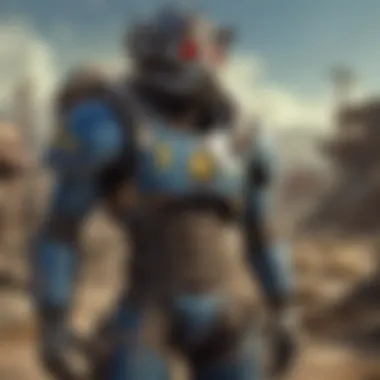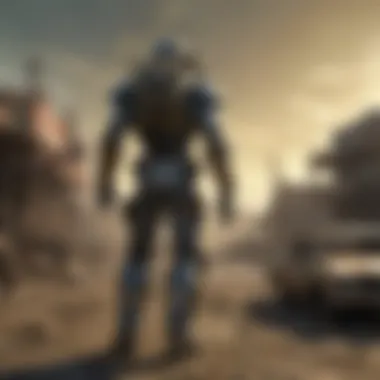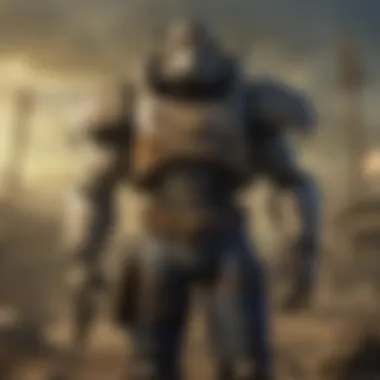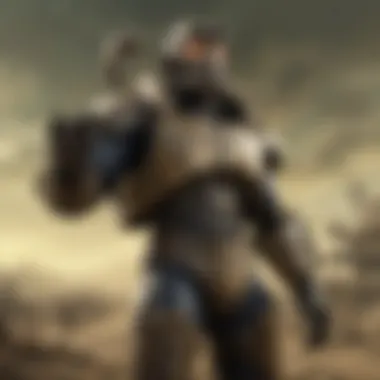Funk and Fallout: The Cultural Resonance of Gaming


Intro
The world of gaming continues to expand, not only in mechanics and graphics but also in cultural narratives. One of the distinct blends of cultural elements can be found in the Fallout series. The aesthetic of this series intertwines with funk music and pop culture in a way that creates a unique experience for players. This article aims to explore these connections in-depth, examining how Fallout incorporates aspects of funk and the broader implications this has within gaming culture. Understanding this interplay can reveal a richer narrative framework, shaping the perception of post-apocalyptic storytelling.
Lore Insights
Overview of the Fallout Universe
Fallout is set in a post-apocalyptic world characterized by nuclear devastation. The universe springs from an alternate history, diverging from our own during the 1950s. Technology developed in a different trajectory, resulting in a society heavily influenced by retro-futurism. This ambiance resonates well with the funk genre, which often merges nostalgia with futuristic themes. The interplay between these two cultural artifacts is not only aesthetic but also thematic, influencing the stories told within this universe.
Key Historical Events in the Fallout Timeline
Numerous events shape the lore of Fallout:
- The Great War: On October 23, 2077, nuclear bombs fell, leading to societal collapse.
- The formation of factions: After the war, several groups emerged, like the Brotherhood of Steel and the Institute.
- The emergence of vaults hinted at societal behaviors and governmental decisions prior to the war, highlighting themes of isolation and survival.
Deep Dive Into the Backstory of Major Factions and Characters
Factions in Fallout illustrate various societal ideologies in response to the apocalypse. For instance, the Brotherhood of Steel places an emphasis on technology preservation, contrasting with the Institute, which embodies a more ethically ambiguous stance towards humanity's future. Each faction’s philosophy is rooted in real-world principles, allowing for deeper engagement with the game's lore. Characters like the Sole Survivor or Piper Wright present diverse relationship dynamics, reflecting broader societal struggles within the Fallout framework.
Gameplay Tips and Strategies
In the Fallout series, successful gameplay hinges on a blend of exploration and strategic decision-making. Beginners may need guidance on several key areas:
- Beginner's guide to playing Fallout games: Start by understanding the perks and skills system. Allocating skill points wisely can impact gameplay significantly.
- Weapon and armor recommendations: Opt for the Combat Shotgun or Laser Rifle early in the game for versatility. When it comes to armor, the Leather Armor set offers a good balance between protection and mobility.
- Tips for efficient resource management: Always gather materials, as crafting is essential in Fallout. Manage your inventory carefully to avoid over-encumbrance, making exploration challenging.
Fan Theories and Speculations
The Fallout community thrives on speculation regarding unresolved plot points. Popular theories explore different narrative strands:
- Some fans speculate about the true nature of the Institute and its future role in Fallout 5.
- Others delve into the possibility of multiple timelines affecting the lore, inviting discussions on the nature of choices in the games.
Finale
The relationship between Fallout, funk, and pop culture presents a complex network of influences and reinterpretations. This synthesis not only enriches the gaming experience but also adds layers to the narratives constructed within these digital worlds. By examining these connections, players can better appreciate the unique aesthetic that Fallout brings to the gaming landscape.
The Fallout Series: An Overview
The Fallout series stands as a pivotal franchise in the gaming industry, known for its intricate storytelling and immersive worlds. When examining the intertwining of funk and pop culture with gaming, understanding Fallout's context becomes essential. This series not only crafts a narrative that explores post-apocalyptic themes but also serves as a medium that reflects societal issues, often infused with a musical backdrop that resonates deeply with players.
The Fallout games have created a rich tapestry of lore and aesthetics that encompass a blend of dark humor, existential philosophy, and nostalgic Americana. As players navigate desolate wastelands, they encounter a world built on the ruins of a nuclear past, where every choice and action carries weight. This depth offers ample opportunities for exploration, not just in gameplay but in the cultural influences that it embraces.


Historical Context of the Fallout Franchise
The origins of the Fallout franchise date back to 1997 with the release of the first game by Interplay Entertainment. Set in a retro-futuristic version of the 1950s, it drew upon the fears of nuclear war prevalent during the Cold War era. This historical context is pivotal. The series explores how society reconstructs itself after devastation, a narrative that resonates today as existential threats loom globally.
The early games positioned themselves as a commentary on technological utopian dreams gone awry, reflecting the anxieties of its time. As the series evolved, particularly with the transition to 3D in Fallout 3, it reached wider audiences. Each installment builds on the previous lore and continually critiques contemporary societal norms.
Key Themes in Fallout Narratives
Fallout's storytelling is layered with complex themes. Several key elements define its narrative:
- Survival and Morality: The struggle to survive in a harsh world introduces moral dilemmas, forcing players to consider the consequences of their actions.
- Power and Corruption: The games often highlight the failures of authority, exploring how power can corrupt even the best of intentions.
- Identity and Memory: Characters grapple with their identities in a world altered by trauma and loss, creating a profound exploration of what it means to be human.
Through these themes, the Fallout series captivates players, inviting them to reflect on their world while navigating the broken realities presented in the games.
Character Development within Fallout
Character development in Fallout is a crucial aspect that enhances player engagement. Unlike many other games, where heroes often emerge unchanged, Fallout allows characters to grow and evolve based on player choices. Players can shape their own stories, determining whether they become merciful leaders or ruthless tyrants.
The series showcases a diverse cast, each character reflecting different societal issues. From morally ambiguous allies to complex enemies, every interaction influences the story's outcome. This dynamic allows a personalized experience where each player's journey is unique, accentuated by the nuanced relationships and dialogue options available.
Understanding Funk Music
Funk music plays a significant role in shaping the cultural landscapes, especially in areas like gaming. In the context of the Fallout series, understanding funk is essential to grasp the deeper layers of the narratives and aesthetics. The genre's rich rhythmic and melodic structures resonate with players, enhancing their immersive experiences. By studying funk, one can appreciate its influence on not only musical composition but also storytelling in games.
Origins and Evolution of Funk
Funk emerged in the late 1960s, fusing elements of jazz, soul, and rhythm and blues. It emphasizes strong rhythmic grooves and intricate bass lines, which are essential components. Artists like James Brown and Sly and the Family Stone were pivotal in this genre's development. Over the decades, funk evolved through various phases, intersecting with styles like disco and hip-hop. Each transformation brought new audiences, further embedding funk into the cultural fabric.
Key Figures in the Funk Genre
Several key figures stand out in the funk music scene.
- James Brown is often credited as the “Godfather of Soul.” His innovative ideas in rhythm laid the groundwork for funk.
- George Clinton, along with his bands Parliament and Funkadelic, introduced a unique blend of funk with rock and psychedelia.
- Prince redefined the genre with his eclectic style that combined funk with pop. These artists not only contributed to the genre's growth but also influenced countless musicians across different styles.
Funk's Influence on Contemporary Music
In recent decades, funk has left an indelible mark on contemporary music. Its grooves can be found in hip-hop, pop, and even electronic music. The revival of funk-infused tracks in modern artists highlights its enduring appeal. For example, bands like Vulfpeck have embraced this tradition, garnering new followers. The richness of funk adds layers of emotion to various musical genres, making it timeless in popular culture. As game developers curate soundtracks, they often look towards the bold and vibrant nature of funk to inject energy into the gaming experience.
Funk's rhythmic complexity and vibrant energy create not just music but an entire cultural movement that influences various art forms.
Understanding these elements of funk music not only enriches the gaming experience but also enhances the appreciation of the narratives that games like Fallout explore. As players engage with the storylines, the connection to funk music deepens, creating a more immersive encounter with the game's universe.
Funk in the Fallout Soundtrack


The inclusion of funk music in the Fallout franchise adds a unique layer to the gaming experience. It is not just about what players hear; it's about how this music shapes their emotions and actions. The soundtrack acts as a bridge between the game's dystopian setting and its vibrant, memorable characters. Funk, in particular, brings a retro vibe that resonates with the series' overall aesthetic.
Musical Styles Featured in Fallout
In the Fallout series, the soundtrack blends various musical styles, prominently featuring funk alongside jazz, rock, and pop. This eclectic mix creates a rich auditory landscape that enhances the gameplay. Funk's rhythmic complexity and strong grooves make it an ideal choice for conveying the energy of the post-apocalyptic world. Notable songs highlight the tension and the relief moments throughout the gameplay.
Some of the musical styles present include:
- Classic funk: Affectionately captures the essence of the 1970s and 1980s.
- Jazz influences: Elevate the ambience, adding an element of smoothness to the harsher environments.
- Rock elements: Infuse a sense of rebellion and bravado that aligns with the game’s themes.
Each track supports the narrative structure while emphasizing specific game mechanics, ensuring that players remain engaged and invested in their journey through the wasteland.
Analysis of Iconic Funk Tracks in Fallout
Funk music plays a crucial role in defining specific moments in the game. Iconic tracks not only complement the setting but also enhance player reactions. For instance, songs like "I Can't Help Myself (Sugar Pie, Honey Bunch)" by the Four Tops and "Tainted Love" by Gloria Jones deliver a sense of nostalgia and connection amidst chaos.
These tracks have been carefully selected, resonating with both the characters and themes. The upbeat tempo of certain funk tunes contrasts sharply with the game’s darker undertones. This juxtaposition amplifies the emotional weight of the story, allowing players to feel a connection to the world they navigate.
Impact of Music on Gameplay Experience
The impact of soundtrack on gameplay experience cannot be overstated. Music serves to establish atmosphere and emotional stakes. When a player encounters threats, the tempo and intensity of the music dictate the pace of their response.
The rhythm and styles employed create a dynamic environment. It motivates players to explore, to fight back, or even to retreat. Moreover, the familiarity of funk can incite personal memories, making each playthrough even more intimate. In essence, the right track can make a moment unforgettable, deeply embedding it in a player's memory.
Understanding these connections offers insight into how soundtracks in video games operate on emotional and psychological levels, ensuring that each player's experience is unique.
Cultural Significance of Funk and Pop Interplay
The integration of funk and pop elements in the Fallout series plays a pivotal role in creating a rich cultural tapestry. This interplay not only enhances the game's aesthetic but also serves as a commentary on broader social issues. Funk music, with its roots in African American culture, often addresses themes of resilience and expression in the face of adversity. Similarly, the parodic nature of pop culture references within Fallout reflects how society copes with trauma, channeling it through humor and satire.
This combination cultivates a sense of nostalgia, drawing players into a world where musical context enhances gameplay experience. Music reproduces the environment, immersing players when traversing through the post-apocalyptic landscape. The juxtaposition of upbeat funk rhythms alongside dystopian visuals creates a unique emotional dichotomy. Here, the cultural interplay reveals how music can provoke thought and engage players on multiple levels.
Funk as a Reflection of Social Issues
Funk music originated during the civil rights movement, acting as a vehicle for social expression. Its celebration of groove and rhythm often positions it as a form of resistance. In Fallout, the musical selections echo this sentiment, with songs encapsulating performance styles that address struggles and celebrations within the context of their narratives. The series, while steeped in humor and irony, reflects serious and sometimes painful social issues through its soundtrack.
For example, tracks that emerged during the height of funk often questioned norms and addressed societal taboos, much like the more sarcastic narratives found within Fallout’s story arcs. The game’s environments serve as reflections of societal collapse, and through funk's historical context, these reflections resonate with real-world struggles. This connection illustrates a dialogue between the player and the game's universe, highlighting engagement with larger historical and cultural dialogues.
Pop Culture References within Fallout
The incorporation of pop culture references within Fallout creates a bridge between the game and contemporary society. These references, often displayed through advertisements, radio stations, and character dialogue, serve as cultural touchstones. They invoke memories of an era that may be irreversibly altered in the game's universe, creating a sense of nostalgia while simultaneously critiquing consumer culture.
Through various pieces of media, from 1950s commercials to musical hits of the time, Fallout cultivates a satirical narrative where fun and familiarity clash with grim realities. Players are drawn into a false sense of security through these references. They denote an America that once was, contrasting sharply with the post-war devastation players explore. The intertwining of pop music also offers light-hearted interludes amid darker themes, showing how entertainment can offer respite even in the direst of situations.


Fan Reception of Musical Elements in Fallout
The musical elements within Fallout have garnered significant acclaim from fans. The ability of funk and pop to enhance narrative depth is routinely discussed in player forums. The energetic beats of classic funk tracks often uplift gameplay, creating memorable moments in quests and explorations. Many players cite specific tracks as integral to their experience, often sharing playlists that incorporate these songs alongside their gameplay footage.
The community shows a deep appreciation for how music interacts with the visual and narrative elements of the game. From Cosplay events that celebrate music to user-created videos that merge funk tracks with memorable scenes, fans are actively engaging with the game's soundtrack. The musical experience is not merely background noise; it transforms into an essential component of the game's identity.
The Fallout Community and Its Musical Preferences
The Fusion of music and gaming in communities like Fallout showcases dynamic interaction among fans. Music triggers emotions, creates memories, and fosters connections, making it a powerful tool in community engagement. When people discuss Fallout, they do not just talk about gameplay or storylines; they also discuss music. This article examines how the Fallout community relates to funk and pop music, illustrating its significance. Understanding these musical preferences opens doors to explore deeper cultural impacts.
The Role of Music in Community Engagement
Music can elevate gameplay experiences in Fallout, detoxing stressful environments within the game. Tracks from the soundtrack become nostalgic hooks that keep players connected to their experiences. An example can be seen in the frequent use of classic funk sounds from the 1970s.
In forums like Reddit, discussions ignite when fans reminisce about certain tracks. Playing the soundtrack can spark cooperative play, where individuals gather to discuss characters and theories. This musical background enhances the social aspect of the community. Musicians and gamers may collaborate in fan art or cosplay, merging diverse talents and fostering engagement.
User-Generated Content and Musical Creativity
The Fallout franchise inspires creativity among its fans. User-generated content (UGC) frequently incorporates music, showcasing how players interpret the game's essence through sound. Many users create mods that replace in-game music with remixes or original funk tracks. This not only allows fans to personalize their experience but embodies a sense of creative ownership.
Platforms like Facebook and YouTube are filled with remixes, original tracks, and covers of popular funk pieces. Creators thrive within a supportive environment utilizing community feedback. The connection between gameplay and music showcases the persistent relevance of funk and the adaptability of players.
Funk and Pop Mashups in Fan Projects
Mashups dominate the musical landscape for contemporary gamers. The blending of funk and pop within Fallout contexts leads to innovative fan projects. Creators experiment with varying tempos and styles, crafting new interpretations that highlight the music's versatility.
Fans share these mashups on platforms like YouTube, often gaining attention for their originality. Some mashups pair iconic Fallout moments with classic funk tracks, enhancing the narrative. These projects showcase talents beyond traditional gameplay.
"Music in Fallout transcends mere background noise; it complements the essence of the games, creating timeless experiences."
In conclusoin, the Fallout community engages deeply with the musical landscape. Funk and pop preferences drive interactions, inspiring creativity that enriches the gaming experience. The community thrives through memories tied to music, shaping the future of the franchise.
Epilogue: The Lasting Impact of Funk and Pop in Fallout
The intersection of funk and pop music with the Fallout franchise creates a unique cultural phenomenon that remains significant. The effects of these musical genres are not just an addition to the game but an integral part of the narrative and emotional landscape. By blending rich, layered soundscapes with compelling storylines, Fallout engages players far beyond traditional gaming experiences. The music resonates with players, evoking nostalgia and connecting themes that mirror societal issues, thereby giving the franchise depth.
Synthesis of Themes and Genres
Throughout the Fallout series, one can observe a purposeful blending of musical themes that reflect the evolving landscape of the gaming world. Funk, with its origins in African American culture, combines with the post-apocalyptic setting to portray resilience and creativity amidst chaos. The upbeat rhythms and intricate basslines often serve as a backdrop to intense gameplay, making moments of discovery or conflict feel more layered.
Moreover, pop culture references in Fallout add another dimension to these themes. Songs like "A Wonderful Guy" and "You’ll Never Know" add a touch of irony and humor to the otherwise grim gameplay. The cleverly chosen tracks highlight contrasts, enhancing the emotional impact of scenes while enriching the storytelling process. The result is a synthesis that enhances not only the gameplay but also fosters community connectivity, as players share their experiences and interpretations of the music's significance.
Future Directions for Fallout Music
The future of music in the Fallout series offers exciting possibilities. As the gaming industry evolves, so do the platforms for musical expression. The introduction of new genres could further deepen the storytelling. There is a potential for more crossover with contemporary artists who can reinterpret funk or explore new musical styles.
Incorporating user-generated content could also revolutionize the musical landscape within Fallout. Platforms like Reddit and fan forums have shown that communities are eager to share their own remixes and creations. Allowing for dynamic soundtracks tailored to player choices could increase engagement.
The Fallout community continues to thrive, and the integration of funk and pop music in its universe proves that music is not merely an accessory to gaming. Instead, it is a vital component that shapes player experiences, echoes cultural narratives, and fosters connections within the community. As the series advances, embracing new sonic identities will undoubtedly play a critical role in its ongoing legacy.







